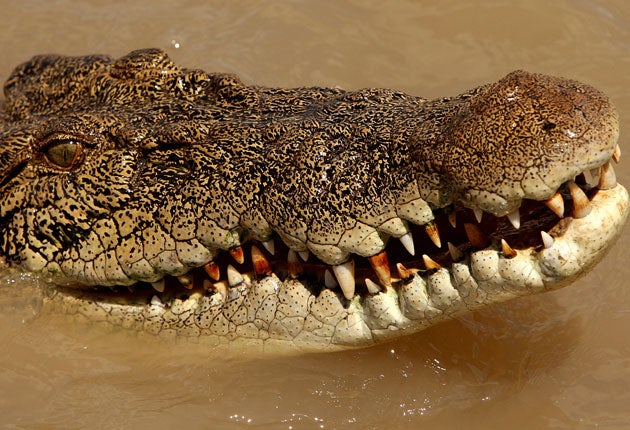Human remains found in crocodile may be Scot
Gruesome discovery could solve mystery of missing Vietnam veteran

A giant crocodile is now the sole suspect in the disappearance of the Scottish-born Vietnam veteran Arthur Booker, who went missing close to a river bank in Queensland, Australia, two weeks ago.
A scan of the crocodile has revealed half-digested human remains inside it, but it will not be put down because Australian conservationists consider it to be an "iconic" animal.
Wildlife officers used X-rays and an endoscope to examine the contents of the crocodile's stomach. They are awaiting DNA tests before they can confirm that the remains are those of Mr Booker, 62, who lived in Logan, near Brisbane, but was originally from Banffshire, north-east Scotland.
He was last seen on 30 September while he was on a camping holiday with his wife in an area of north Queensland by the river Endeavour known as "Cape Crocodile". The couple had packed their four-wheel drive car and caravan and were on the point of leaving the campsite, when Mr Booker decided to go down to the river to check on a crab pot.
His wife, Doris, waited in the car. When he did not return, she went looking for him and found that the rope that had held the crab pot had been snapped. There were crocodile slide marks in the mud. She also found her husband's sandals, one of which had claw marks, and his video camera.
The area is a natural habitat for saltwater crocodiles, which are opportunistic, territorial hunters. It is not known whether Mr Booker went into the river to find his crab pot, or was dragged in by the crocodile.
Before the human remains were discovered, the Australian media reported that a scan had detected a wedding ring inside the crocodile's stomach but the police had played down the discovery.
A life of captivity awaits Mr Booker's suspected killer, which is 14ft long, weighs half a ton, and is described by his handlers as "aggressive". It is currently being held at a facility in Cairns, Queensland, run by the Environmental Protection Agency, until a suitable permanent home can be found.
"As it is an iconic animal, the crocodile will not be harmed or killed," said an agency spokeswoman. "But it will not be released back into the wild."
The incident has prompted calls among some locals for a cull of saltwater crocodiles, which are a protected species under Australian law. However, the naturalist Bob Irwin, father of the late "Crocodile Hunter" Steve Irwin is one of several prominent Australians who pleaded that there should no revenge taken. "We have to remember that the crocodile is a vital part of the eco-system and it was behaving naturally," he told the Brisbane Times.
Gary Zeillfeisch, the former owner of Hartley's Creek wildlife reserve near Cairns, said the crocodile should be sent to a farm or zoo. "Killing the animal is out of the question – it's nature and it's unfortunate that somebody becomes a victim," he said.
Mr Booker moved to Australia with his parents in the 1950s. He did two tours of duty in Vietnam with the 1st Armoured Regiment (Australia).
Subscribe to Independent Premium to bookmark this article
Want to bookmark your favourite articles and stories to read or reference later? Start your Independent Premium subscription today.

Join our commenting forum
Join thought-provoking conversations, follow other Independent readers and see their replies